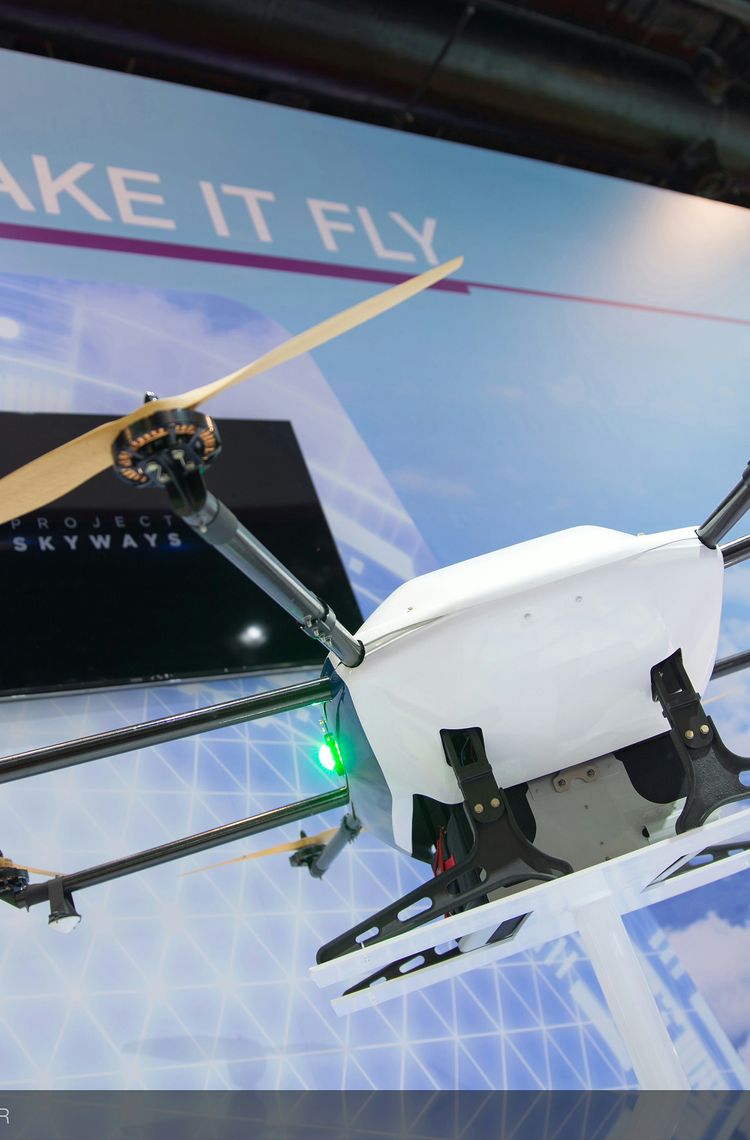Skyways drone project in the spotlight at the 2018 Singapore Airshow
In partnership with the Civil Aviation Authority of Singapore (CAAS), Airbus is on track to test an automated package delivery system using unmanned drones in the first half of 2018.
Dubbed Skyways, the project signed up SingPost in April 2017 as its logistics partner to trial small parcel delivery via autonomous drones to designated stations on the campus of the National University of Singapore (NUS). Incoming packages are first loaded automatically onto the drone via a robotic arm at designated parcel stations. Drones launch and fly autonomously, delivering the package to delivery stations on the campus, where it is then stored in lockers for campus dwellers to retrieve it.
The drones will fly along aerial corridors to avoid collision while the central ground operations centre continuously monitors flight operations and unmanned air traffic.
There’s nothing toy-like about these drones: they are sophisticated, high-end aeronautical products that draw upon the technical and engineering expertise of both Airbus Helicopters in terms of air vehicles and Airbus Defence and Space in terms of batteries and command centre capabilities, among others.
The systems architecture, first developed and validated in France, was finalized and then designed and built in Singapore. “We will have five or six drones flying in the initial trial phase this year and we expect it to run several months to be able to collect relevant data and insights,” explains design office head at Airbus Helicopters and Skyways project lead Leo Jeoh.
When asked why the project is based in Singapore, Jeoh, a former Singapore Air Force flight test engineer, replies: “While the country already has efficient delivery services, the real reason is that Singapore is a fantastic test bed for new technologies and business models. The combined support of the CAAS and an innovation-friendly government creates an ideal environment to perfect the system and roll it out faster than in other locations.”
Singapore as well as many of Asia’s megacities, such as Jakarta, Bangkok and Manila, suffers from traffic congestion, a growing urban trend with no lull in sight. In the future, an airborne package delivery system could save lives by ditching the roads to airlift medical supplies across town or even help build businesses by making it easier to get products to customers without the need for shops or delivery trucks.
If successful, the Skyways team intends to extend the scope of initial test phase to deliver packages to ships anchored in the Port of Singapore. Later iterations could include delivering higher-value goods or medical supplies to disaster-hit regions, where roads may be impassable.
“Tech development is far from being the only hurdle to overcome to rollout full-fledged drone delivery in cities,” states Jeoh. Drones will eventually need to share airspace with passenger aircraft and rotorcraft, military vehicles and other aircraft, and this will require a sophisticated traffic management system to avoid collisions.
“We see Skyways as an important stepping stone in paving the way for air mobility in urban settings. It’s an awesome opportunity for Airbus to run a first live autonomous and electric urban air mobility exploration. We are essentially opening up Pandora’s box to determine what it will take for unmanned vehicles to fly safely in cities. All regulatory issues must be properly addressed before we will see either drones or larger passenger electric vertical take-off and landing vehicles (eVTOLs) such as CityAirbus flying above our heads.”
Gaining trust from regulators and end users is paramount in the quest to make urban air mobility a reality. “I am convinced that Airbus will be pivotal in the shift from ground to air transportation in urban spaces,” says Jeoh. “Through our strong relationship with CAAS, the NUS and SingPost, we will be able to run a meaningful trial that allows us to explore and develop regulations, technologies, and operational requirements to safely operate unmanned vehicles in urban environments while gaining valuable insight from campus dwellers on how they feel about the tech flying around.”
